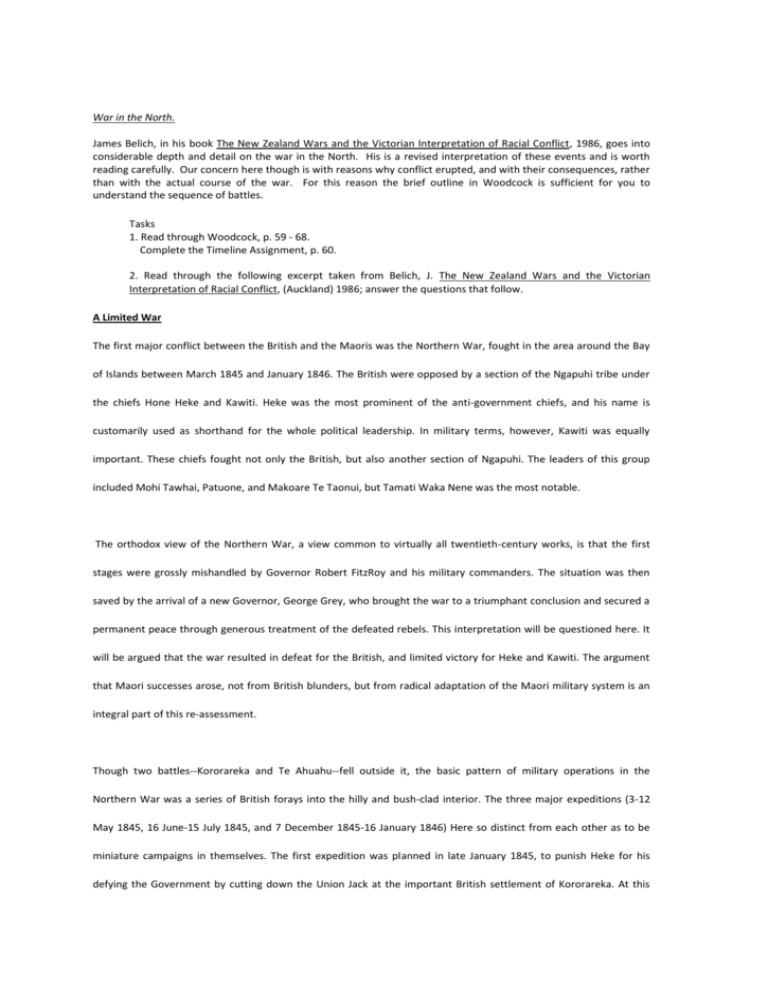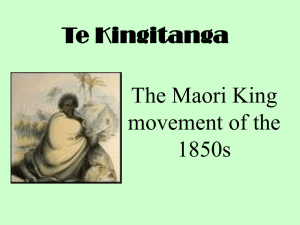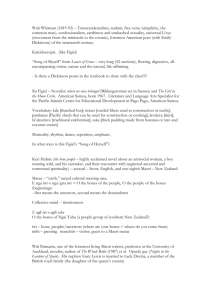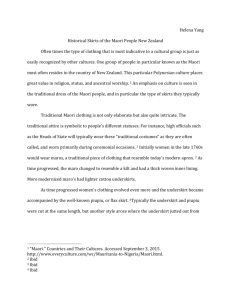northern war historiography
advertisement

War in the North. James Belich, in his book The New Zealand Wars and the Victorian Interpretation of Racial Conflict, 1986, goes into considerable depth and detail on the war in the North. His is a revised interpretation of these events and is worth reading carefully. Our concern here though is with reasons why conflict erupted, and with their consequences, rather than with the actual course of the war. For this reason the brief outline in Woodcock is sufficient for you to understand the sequence of battles. Tasks 1. Read through Woodcock, p. 59 - 68. Complete the Timeline Assignment, p. 60. 2. Read through the following excerpt taken from Belich, J. The New Zealand Wars and the Victorian Interpretation of Racial Conflict, (Auckland) 1986; answer the questions that follow. A Limited War The first major conflict between the British and the Maoris was the Northern War, fought in the area around the Bay of Islands between March 1845 and January 1846. The British were opposed by a section of the Ngapuhi tribe under the chiefs Hone Heke and Kawiti. Heke was the most prominent of the anti-government chiefs, and his name is customarily used as shorthand for the whole political leadership. In military terms, however, Kawiti was equally important. These chiefs fought not only the British, but also another section of Ngapuhi. The leaders of this group included Mohi Tawhai, Patuone, and Makoare Te Taonui, but Tamati Waka Nene was the most notable. The orthodox view of the Northern War, a view common to virtually all twentieth-century works, is that the first stages were grossly mishandled by Governor Robert FitzRoy and his military commanders. The situation was then saved by the arrival of a new Governor, George Grey, who brought the war to a triumphant conclusion and secured a permanent peace through generous treatment of the defeated rebels. This interpretation will be questioned here. It will be argued that the war resulted in defeat for the British, and limited victory for Heke and Kawiti. The argument that Maori successes arose, not from British blunders, but from radical adaptation of the Maori military system is an integral part of this re-assessment. Though two battles--Kororareka and Te Ahuahu--fell outside it, the basic pattern of military operations in the Northern War was a series of British forays into the hilly and bush-clad interior. The three major expeditions (3-12 May 1845, 16 June-15 July 1845, and 7 December 1845-16 January 1846) Here so distinct from each other as to be miniature campaigns in themselves. The first expedition was planned in late January 1845, to punish Heke for his defying the Government by cutting down the Union Jack at the important British settlement of Kororareka. At this stage, the British may have been content to teach Heke a lesson. But the expedition was not mounted until after Heke and Kawiti had captured Kororareka on 11 March 1845, and from this point the British objective became unequivocal and deadly. Each expedition was intended to kill or capture Heke or Rawiti and to destroy their forces. The objectives of both the resisting and the collaborating Ngapuhi factions, however, are less simple and they require closer examination. RESISTANCE AND COLLABORATION Some understanding of the deeper causes of conflict is important to the military analysis of the Northern War. If Heke was aiming to expel the British from the North and to turn back the clock to pre- annexation days, as is often implied, then he clearly failed. If his objective was less comprehensive, then the question remains open. The problem of war aims is complicated by the possibility that the Northern War was a three-sided conflict - that Waka had different objectives from his allies the British. The differences between Ngapuhi resisters and collaborators were less remarkable than their common ground. Both groups adhered to the two great Maori principles of early race relations: a determination to uphold chiefly authority against arbitrary British interference, and a desire for interaction with Europeans. The division arose, perhaps, when measures in support of the former principle seemed to militate against the latter - when the defense of one aspect of the status quo threatened another. Thus the cleavage between resistance and collaboration was narrow; a matter of perception and emphasis, rather than fundamental attitudes. The early British governors were aware that any attempt suddenly to impose substantive sovereignty was beyond their resources. But they did expect to impose ordinances, apply some laws, and take certain actions which concerned Maoris, without necessarily consulting the chiefs. Some measures which affected the Bay of Islands were the imposition of customs dues, restrictions on the felling of certain types of timber, and the removal of the capital from Kororareka to Auckland. All this diverted settlers from the North and reduced economic activity, and it coincided with a downturn in demand for New Zealand products in Australian markets. Government interference, in itself objectionable, was also acting against the second Maori imperative - an adequate level of interaction with Europeans. By reacting to this, Ngapuhi resisters were pushing for more European contact, not less. Other government measures affecting the Bay of Islands included the execution of the minor Ngapuhi chief Maketu in 1842, for murder. The application of British law was only possible because it happened to coincide with Maori law, but it still created some resentment. When Robert FitzRoy, a conscientious man of some ability and more moral courage, became Governor in December 1843, he investigated land sales and applied the Crown's pre-emptive right to the purchase of Maori land. His police magistrate at Kororareka, Thomas Beckham, did his best to apply British law in the town at least with the few constables available to him. The local settlers were naturally more reluctant to submit to chiefly arbitration than to Maori law. For Ngapuhi, this compounded the pre-existing problem of applying traditional law to the new range of disputes resulting from informal European settlement and contact, and of upholding chiefly authority in the face of this and other pressures. Hone Heke simply shared in the common recognition of the problem of government interference, but he was an exponent of vigorous solutions to it. One of these solutions, basically a peaceful policy, was the energetic application of Maori law and Maori local authority. Though they were hostile to his efforts, European observers could not fail to note them. One wrote that Heke 'had constituted himself a Court of Inquisition: wherever he could hear of an offence, he would come down upon the offender with a taua [war party], on the plea of administering justice." Comments like these have given Heke a reputation as a 'congenital busybody, but his activities are open to a more favorable interpretation. His judgement was not unfair and his approach was not biased against Europeans under his control. The term 'my pakeha' implied responsibility as well as authority. In October 1844 he took one of his Pakehas to task for using timber from tapu (sacred) ground, but added that his lieutenant 'will arrange for you to get the necessary trees on unconsecrated ground. In general, his letter to this settler was intended to search out wrongs in every portion of the country ... interpret these words to the Europeans, also to the Maoris ... if you the Europeans, will do [your] part, I will do mine and make amends for any wrong acts of the Maori people. Balanced as they were, Heke's efforts were not appreciated by the settlers, who believed that substantive sovereignty now rested with their race. Maori law continued to be contravened in a variety of incidents, and the settlers became increasingly reluctant to part with the customary compensation for their misdemeanors. It seemed to Heke - and to most other northern chiefs - that the bulk of their problems and prospective problems arose from government attempts to interfere in their sphere of activity. In mid-1844, Heke decided to resist the incursions closer to their source, rather than to continue to rely on ad hoc efforts to cope with their effects. The problem with direct measures, however, was that they could easily militate against the second of the Maori imperatives. Heke, like most other chiefs, wished to preserve the valuable Maori-European economic relationship. When war broke out, Heke's solution to this problem was to attempt to walk the fine line between conflict with the government and conflict with the Europeans as a whole. As he himself put it: 'To the soldiers only, who are enemies to our power, to our authority over the land, also to our authority over our people, let our hearts be dark.' It is generally accepted that throughout the war he made every effort to avoid harming the settlers of his area and their property. Though some settlers chose to flee, others resided behind the lines in perfect safety. It is sometimes suggested that Kawiti had a different attitude, but in fact he too sought to protect the settlers and to prevent the looting of anything other than abandoned property. 'Heke and the other chiefs declared it was never their intention to disturb the settlers, but on the contrary to protect them.' Missionaries observed that the occupation of their settlements by the anti-government forces did far less damage than the occupation by the troops. Other than those fighting as volunteers beside the soldiers, no civilians were intentionally killed by the Maoris in this war. Heke's forces did sack Kororareka at the beginning of the war, but it is generally agreed that this was not his intention when he attacked the troops protecting the town. Once it was abandoned, no general in the world could keep his men from plundering a town full of rum. Neutral Maoris, some of Waka's allies, and even some Europeans, are also reported to have taken part in the sack. Heke went so far as to allow his desire to protect local Europeans to interfere with his war effort. He revoked his orders to destroy certain bridges when it was represented to him that these were used by civilians as well as troops. This attitude is sometimes explained in terms of Heke's chivalry or his military naivety, but in fact self-interest is a sufficient explanation. As with other Maori communities in areas of long and substantial contact, the hapu supporting Heke and Kawiti would suffer considerable deprivation, real and perceived, from an exodus of Europeans. The last thing the anti-government forces in the Northern War wanted was the total expulsion of the British from their area. Heke's conduct during the war was profoundly influenced by this factor, and so were the measures he took which led to conflict. In mid-1844 he concluded that the Union Jack flying on a large flagstaff on Maiki Hill, above Kororareka, could usefully be taken as the symbol of British sovereignty in the area without causing damage to economic relations. On 8 July 1844, he cut it down. It was a repetition of this act, on 18 January 1845, which actually triggered off the war. Again, it is sometimes assumed that Heke was being naive or disingenuous in taking a flag as the symbol of what he disliked about the new order. His fixation with 'a mere stick' can be seen as evidence of his living in a world of his own, and readers of some works on the war are left to assume that Heke's threats and depredations rather than his amputation of the flagstaff constituted the British casus belli. In fact the British took the incident very seriously. It is true that FitzRoy called the flagstaff 'a mere stick', and this is sometimes quoted, but he finished the sentence with: 'but as connected with the British Flag of very great importance'. The American consul at Kororareka was believed to be encouraging the anti-government group, and Magistrate Beckham wished to take a leaf out of Heke's book by cutting down the consul's flagstaff. The amputation of the flagstaff had substantive implications as well as symbolic significance. If the British could not protect the flagstaff of their largest settlement north of Auckland, what could they protect! And how much credibility could their claims to substantive sovereignty retain? It may be true that Heke was ambitious and egotistical, and it is certainly true that he sometimes used the rhetoric of a war of liberation. During the war, he referred frequently to a British desire to seize all Maori land. He berated them for their 'condemnation of the New Zealanders as slaves, and reiterated his determination to 'die for the Country provided for us by the Almighty. These statements must be treated with both respect and caution. Heke clearly did see the threat to chiefly authority, and the prospective ; threat to Maori land ownership, as problems which affected much more than his status alone. He was familiar with the fate of aborigines in other areas of European colonization. But his anti-British statements were very strongly worded for a man who never intentionally hurt a hair on a single British civilian's head. His resistance was in a sense designed to counter British imperialism, but only in a very limited way - so limited, in fact, that it was little more than the defense of a status quo of which British settlers were an integral part. He fought less to overturn the Treaty of Waitangi than to ensure the application of its Maori version. He wished to safeguard order, stability, and peace, through the energetic application of traditional law. He wished to preserve Maori local independence and the chiefly authority which protected it. He wished to regulate, not reject, European contact and settlement. The motives of Waka and his allies in resisting Heke constitute a complex problem, and no definitive explanation can be offered here. However, two important points may be made. The first is that Waka and his allies shared Heke's concern about government interference in local affairs, and until a month before the war the level of their resentment was almost as great as his. Diplomatic measures by FitzRoy in September 1844 temporarily dampened the disaffection, but subsequent incidents rekindled it. In February 1845, the pro-government chiefs held a conference at Paihia, at which it was clear that 'Waka and other friendly chiefs were perfectly confounded as to the intention of the Government'. Waka himself was particularly irritated by an ordinance against felling kauri timber and 'openly declared that if the Governor had been at Hokianga he would have felled a spar in his presence to see what would happen'. Like Heke, these chiefs related current examples of government interference to the Treaty of Waitangi. 'The general reason for [the] dissatisfaction of the natives', wrote Beckham, 'appears to have been the misunderstanding [of] the Treaty of Waitangi, they conceiving that it took from them their chieftainship and lands.' The most influential missionary in the area, Archdeacon Henry Williams,was present at the meeting in February 1845. In 1840, Williams had been a major influence in inducing the Northern chiefs to sign at Waitangi, and now he found himself 'well nigh cut down for taking the part I did, relative to the Treaty'. However, by speaking at length in defense of the Treaty, and by distributing 300 copies of its Maori version, Williams was able to 'relieve their minds'. The Archdeacon wrote that 'but for the timely distribution of the Treaty I hesitate not to say that the native population to a man would have been in arms'. Williams's coup, however, meant that only Heke, Kawiti, and their immediate supporters continued to believe that the Treaty was, in Heke's phrase, 'soft soap'.'" FitzRoy had removed the customs taxes after an earlier meeting in September 1844 and had partly convinced the chiefs that government interference hitherto had been largely misunderstood. Williams successfully asserted that these encroachments were not the tip of the iceberg and that the Treaty was not a trap. A major distinction between Wakas group and Heke's was that the former were convinced by FitzRoy and Williams, whereas the latter were not. The second point deduces something about Waka's objectives in entering the war from his conduct during it. It is often assumed that Waka and his allies shared the British wish to capture Heke and to destroy his power, but in fact Waka's measures against Heke covered the whole range of Maori sanctions and usually stopped short of war to the death. Waka and his associates began by trying to dissuade Heke from his course. Later in January, they provided guards for the flagstaff. These, however, did not use force when Heke cut the staff down for the third time. Hostilities between Heke and the British began on 3 March 1845, and were clearly in the offing for some time before this. But Waka did not take the field until late March, and then he at first simply tried to persuade Heke to go home. To verbal persuasion he added what amounted to a taua muru against Heke's property -a legal plundering expedition in which blood was not shed. Hostilities between Maori and Maori commenced in early April. But the fighting had the character of restrained feuding, as befitted a contest for limited objectives between hapu of the same tribe. 'By mutual arrangement, no ambuscades were laid, and the fighting was only in daylight.' The contesting parties returned each other's prisoners, and though skirmishing continued throughout April, few men were killed. After the first British punitive expedition had ended, Heke still refused to make peace and accused Waka of 'fighting for blankets' - for what he could get from the British in the most mercenary sense. This exhausted Waka's considerable patience and he finally took decided measures against Heke which culminated in the Battle of Te Ahuahu on 12 June. However Waka was supported in this engagement by only one of his allies, and Heke's main ally, Kawiti, was also absent. Both Te Ahuahu and the April skirmishes were fought without any interference by the British. The pro-government Maoris accompanied the British on each of their three expeditions, but their conduct in these was ambivalent. They scouted for the British, skirmished fiercely with the enemy, and risked their lives to save wounded soldiers, but they did not join in the decisive clashes. This is sometimes explained in terms of their reluctance to participate in assaults which they thought would fail. But at the Battle of Puketutu on 8 May, where it was clear that an assault was likely to succeed, they hardly assisted the British in combat at all. It seems fair to suggest from all this that the feud between the two Ngapuhi factions constituted a war within a war. It was fought at a different level of intensity from the British-Maori conflict, and it seems to follow that it was fought for different ends. Wake's group, then, shared Heke's desire to preserve Maori local independence, but came to differ from him in the perception of how acute a danger to this the government represented. Unlike their British allies, they fought a limited war against Heke and Kawiti. Exactly what their restrained operations were intended to achieve is difficult to establish with confidence. Heke's perceived ambition, and his law-giving operations, probably aroused the resentment of other chiefs. Satisfaction for traditional grievances may also have been a factor, but these may equally have acted as ceremonial justifications, like European border disputes, to cover more substantive differences. For, in defending the status quo from one threat, Heke created another danger to it. Heke believed that he could preserve the EuropeanMaori economic relationship while fighting the government, whereas Waka disagreed. There was some truth in each view. The economic disruption caused by Heke's resistance was temporary, and some Europeans remained behind his lines. But others fled to Auckland, and Heke could not prevent the sack of Kororareka. Significantly, Waka did not take the field until after the loss of this valuable entrep6t, and then he would have done so whether the British liked it or not. For enemies, the war-aims of Heke and Waka may have had a great deal in common. Each may have been protecting a different aspect of the same status quo. But whatever the precise motives of Waka and his allies, this was clearly a war of three sides in which only the British aimed for total victory through the capture or annihilation of their enemies. 1 1 ibid, p. 29 - 36








